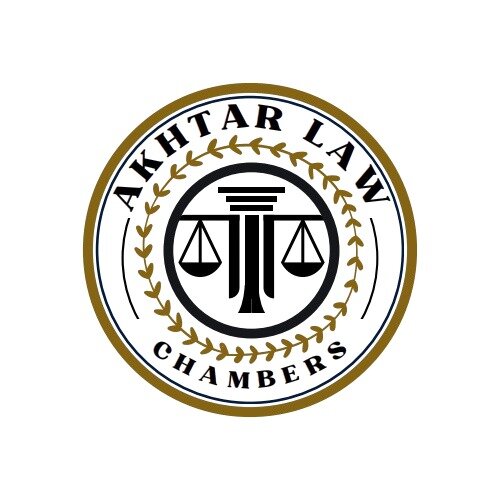Best Telecommunications and Broadcast Lawyers in Pakistan
Share your needs with us, get contacted by law firms.
Free. Takes 2 min.
Or refine your search by selecting a city:
List of the best lawyers in Pakistan
About Telecommunications and Broadcast Law in Pakistan
Telecommunications and Broadcast Law in Pakistan governs the transmission of information through various forms of technology, including telephony, internet, and television. This legal framework is regulated by the Pakistan Telecommunication Authority (PTA) and the Ministry of Information and Broadcasting. The industry encompasses various services such as mobile communications, television broadcasts, and internet service provisions, critical in connecting individuals and businesses across the nation. The legislative and regulatory environment ensures the orderly operation of telecommunications services and the protection of users' rights.
Why You May Need a Lawyer
There are several situations where you may require legal assistance in the field of Telecommunications and Broadcast:
- Compliance with regulations: Businesses may need legal advice to ensure they comply with the PTA guidelines and broadcasting rules.
- Licensing issues: Companies might face challenges in obtaining or renewing the necessary licenses to operate.
- Intellectual property disputes: Disputes may arise over content or software used in telecommunication services.
- Consumer protection: Users might require legal help with issues like fraudulent services or billing disputes.
- Privacy and data protection: Legal advice is needed to navigate privacy laws and data protection regulations.
Local Laws Overview
The key aspects of local laws in Telecommunications and Broadcast in Pakistan include:
- The Pakistan Telecommunication (Re-organization) Act, 1996: This law provides a framework for the regulation of telecommunications services and the establishment of the PTA.
- Electronic Media Regulations: Overseen by the Pakistan Electronic Media Regulatory Authority (PEMRA), this includes licensing and regulation of broadcast media.
- Data Protection Laws: While still developing, these laws address the privacy and protection of personal data.
- Consumer Protection Laws: Protect consumers against unfair trade practices in telecommunications.
Frequently Asked Questions
How do I obtain a telecom license in Pakistan?
To obtain a telecom license, you must apply to the PTA, meeting all the regulatory requirements and ensuring compliance with technical and financial criteria.
What is PEMRA and its role in broadcasting?
PEMRA is the Pakistan Electronic Media Regulatory Authority, responsible for facilitating and regulating electronic media, ensuring adherence to standards, and issuing licenses.
How is internet safety and privacy managed?
The PTA oversees internet safety standards and compliance from service providers ensuring consumer data is protected under existing and evolving data protection laws.
Can I appeal against a decision made by the PTA?
Yes, if you are not satisfied with a decision made by the PTA, you have the right to appeal through the legal framework provided under Pakistan's telecommunication laws.
What are the penalties for broadcasting without a license?
Broadcasting without a license can result in heavy fines, imprisonment, or both as determined by regulatory authorities like PEMRA.
Is there any regulation on cross-media ownership?
Yes, the authorities regulate cross-media ownership to prevent monopolistic control and ensure a diverse media landscape.
How do the laws protect against harmful or offensive content?
Regulations guard against transmitting harmful content, with options to report such content to the respective regulatory bodies for action.
What legal standards exist for telecom infrastructure sharing?
There are guidelines facilitating telecom infrastructure-sharing among providers to improve service delivery and reduce duplication costs.
What is the process for consumer grievance redressal?
Consumers can file complaints with their service provider initially and escalate unresolved issues to the PTA or relevant consumer courts.
How does the government address cybercrime in telecommunications?
Cybercrime is addressed through specific laws such as the Prevention of Electronic Crimes Act, dealing with offenses related to the misuse of technology.
Additional Resources
For additional help or information, consider reaching out to:
- Pakistan Telecommunication Authority (PTA): The regulatory authority for telecommunication services.
- Pakistan Electronic Media Regulatory Authority (PEMRA): Handles licensing and regulation of electronic media content.
- Ministry of Information and Broadcasting: Provides policies on print and electronic media.
- Consumer Protection Courts: For resolving disputes in the telecommunications sector.
Next Steps
If you need legal assistance in Telecommunications and Broadcast in Pakistan, consider the following steps:
- Identify the specific issue you are facing, whether it is compliance, licensing, consumer protection, or other legal matters.
- Reach out to a legal professional with expertise in telecommunications and broadcasting laws to guide you through the intricacies of legal requirements and options.
- Prepare any relevant documents and evidence to present your case effectively to the legal advisor.
- Consider utilizing resources such as the PTA or legal publications to stay informed of your rights and responsibilities.
Lawzana helps you find the best lawyers and law firms in Pakistan through a curated and pre-screened list of qualified legal professionals. Our platform offers rankings and detailed profiles of attorneys and law firms, allowing you to compare based on practice areas, including Telecommunications and Broadcast, experience, and client feedback.
Each profile includes a description of the firm's areas of practice, client reviews, team members and partners, year of establishment, spoken languages, office locations, contact information, social media presence, and any published articles or resources. Most firms on our platform speak English and are experienced in both local and international legal matters.
Get a quote from top-rated law firms in Pakistan — quickly, securely, and without unnecessary hassle.
Disclaimer:
The information provided on this page is for general informational purposes only and does not constitute legal advice. While we strive to ensure the accuracy and relevance of the content, legal information may change over time, and interpretations of the law can vary. You should always consult with a qualified legal professional for advice specific to your situation.
We disclaim all liability for actions taken or not taken based on the content of this page. If you believe any information is incorrect or outdated, please contact us, and we will review and update it where appropriate.
Browse telecommunications and broadcast law firms by city in Pakistan
Refine your search by selecting a city.

















